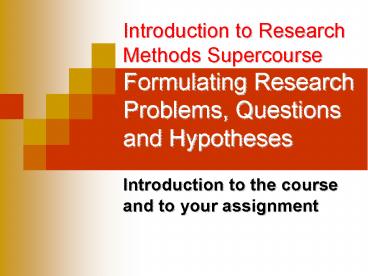Introduction to Research Methods Supercourse Formulating Research Problems, Questions and Hypotheses
Title:
Introduction to Research Methods Supercourse Formulating Research Problems, Questions and Hypotheses
Description:
Introduction to Research Methods Supercourse Formulating Research Problems, Questions and Hypotheses Introduction to the course and to your assignment –
Number of Views:189
Avg rating:3.0/5.0
Title: Introduction to Research Methods Supercourse Formulating Research Problems, Questions and Hypotheses
1
Introduction to Research Methods
SupercourseFormulating Research Problems,
Questions and Hypotheses
- Introduction to the course and to your assignment
2
This project is made possible by the support of
the American people through the United States
Agency for International Development (USAID).
3
Special thank you to workshop organizers and
Nazarbayev University for hosting us
4
(No Transcript)
5
What is this course designed to achieve?
- Introduce the concept of research methods
- Describe basic biostatistical methods
- Introduce trainees to biostatistical software
- Introduce trainees to publication and research
process - Introduce steps needed in research development
- Introduce the Central Asian Journal of Global
Health (CAJGH)
6
Course assignment Develop a research project
- Learn the general steps in the research process
from research idea to project implementation - Identify a research problem
- Define research questions, directional and
non-directional hypotheses - Identify the best possible research design for
your hypotheses
7
Research Defined
- Research is an organized and systematic way to
find answers to questions - Research is a creative process
8
Why is research important to medicine and public
health?
- Knowledge obtained from sound research is
transformed into clinical practice, leading to
medical practice that is evidence-based.
9
The Research Idea
- Professional experience
- Burning questions
- Literature
- Professional meetings
- Discussions
10
Criteria for developing a good research question
- Feasible
- Interesting
- Novel
- Ethical
- Relevant
- Cummings et al. 2001
11
Good research question?
- Feasible
- Subjects
- Resources
- Manageable
- Data available?
- Interesting
- Novel
- In relation to previous findings
- Confirm or refute?
- New setting, new population
- Ethical
- Social or scientific value
- Safe
- Relevant
- Advance scientific knowledge?
- Influence clinical practice?
- Impact health policy?
- Guide future research?
12
A Research Question Must Identify
- The variables under study
- The population being studied
- The testability of the question
13
Variables in research
- Have 2 or more properties or qualities
- Age, sex, weight, height
- Is one variable related to another?
- Is X related to Y? What is the effect of X on
Y? etc.
14
Variables in research
- Independent variable
- has a presumed effect on the dependent variable
(outcome) - May or may not be manipulated
- Dependent variable
- Something that varies with a change in the
independent variable - Outcome variable
15
Hypothesis
- Statement about the relationship between 2 or
more variables - Converts the question into a statement that
predicts an expected outcome - A unit or subset of the research problem
16
Characteristics of hypotheses
- Declarative statement that identifies the
predicted relationship between 2 or more
variables - Testability
- Based on sound scientific theory/rationale
17
Directional vs. Non-Directional Hypotheses
- Directional hypothesis
- Specifies the direction of the relationship
between independent and dependent variables - Non-directional hypothesis
- Shows the existence of a relationship between
variables but no direction is specified
18
Finding appropriate research design
- Cohort
- Cross sectional
- Case control
- Clinical trial
- ?
19
Prepare PowerPoint presentaiton
- 10 minutes long
- 10 slides
- Select 1 presenter from each group
- Present during the last day
- Each presentation should include research area,
significance, hypothesis, and rough design of the
experiment
20
Practical applications of this project?
- Create your own research project
- Understand published research papers
- Understand presentations at scientific
conferences - Publish your research!!
21
Central Asian Journal of Global Health
- Welcome!
22
What is CAJGH
- Biannual open access journal
- Focus area is Central Asian Region
- Peer reviewed
- Started in April 2012 as a part of USAID project
- Distinguished Editorial Advisory board
23
(No Transcript)
24
Questions?
- Faina.linkov_at_gmail.com































